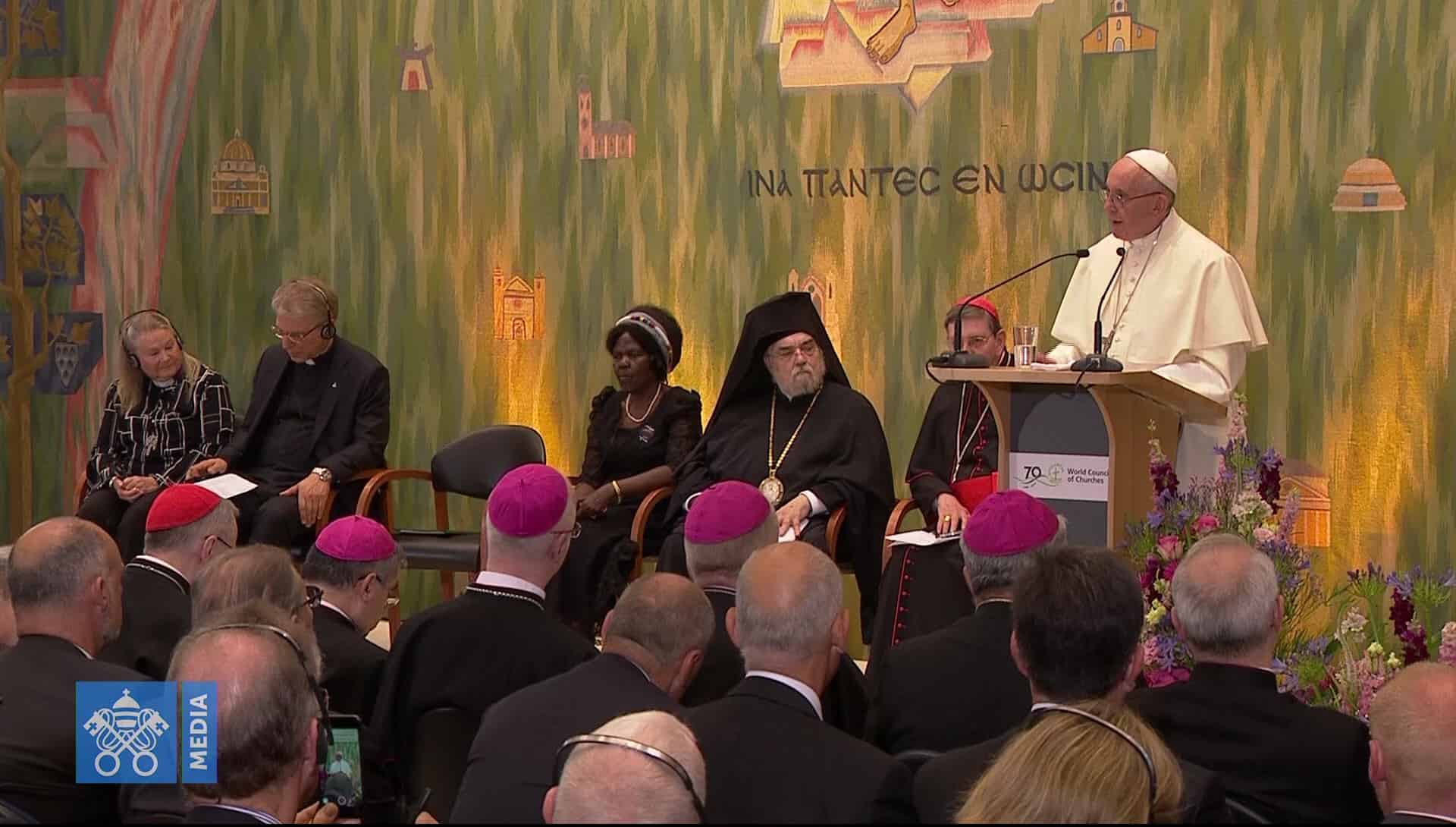Pope calls for concrete action to promote Christian unity
The Norwegian-born secretary general of the World Council of Churches (WCC), Dr Olav Fykse Tveit, hailed the Pope’s visit as “a sign of hope” and “a milestone in the relations among the churches.”
Jun 28, 2018

By Gerard O’Connell
The Norwegian-born secretary general of the World Council of Churches (WCC), Dr Olav Fykse Tveit, hailed the Pope’s visit as “a sign of hope” and “a milestone in the relations among the churches.” He told him, “You came from one ‘end of the world,’ from the far south, as you said when you were elected. We are here together as women and men, young and old, from South and North, East and West.”
Addressing the WCC, Francis emphasised that “our lack of unity is in fact not only openly contrary to the will of Christ but is also a scandal to the world and harms the most holy of causes: the preaching of the Gospel to every creature.”
He highlighted two important ways to achieve unity. First, he said, “what is really needed is a new evangelical outreach.” He told them, “I am personally convinced that an increased missionary impulse will lead us to greater unity. Just as in the early days, preaching marked the springtime of the church, so evangelisation will mark the flowering of a new ecumenical summer.”
He emphasised the need for this “new evangelical outreach” because of a concern that “comes from an impression that ecumenism and mission are no longer as closely intertwined as they were at the beginning.” He reminded this worldwide body of churches that “the missionary mandate, which is more than diakonia and the promotion of human development, cannot be neglected nor emptied of its content. It determines our very identity.” He insisted that “the preaching of the Gospel to the ends of the earth is part of our very being as Christians.”
Francis indicated that a second important way to achieve unity is for the WCC and the Catholic Church to work together in every way possible in concrete loving service to a suffering and divided humanity.
“The work of our Christian communities is rightly defined by the word diakonia. It is our way of following the Master who came ‘not to be served but to serve,’” he said. “The credibility of the Gospel is put to the test by the way Christians respond to the cry of all those, in every part of the world, who suffer unjustly from the baleful spread of an exclusion that, by generating poverty, foments conflicts.
“The Lord, the Good Samaritan of mankind, will examine us on our love for our neighbour, for each of our neighbours. So let us ask ourselves: What can we do together? If a particular form of service is possible, why not plan and carry it out together, and thus start to experience a more intense fraternity in the exercise of concrete charity?”
Seeking to encourage them, he said, “Let us see what we can do concretely, rather than grow discouraged about what we cannot. Let us also look to our many brothers and sisters in various parts of the world, particularly in the Middle East, who suffer because they are Christians. Let us draw close to them.” He reminded everyone that “our ecumenical journey is preceded and accompanied by an ecumenism already realised, the ecumenism of blood, which urges us to go forward.”
He called on the WCC and Catholic Church to “help men and women of good will to grow in concern for events and situations that affect a great part of humanity but seldom make it to the front page. We cannot look the other way.”
Pope Francis thanked the council for its commitment to unity over these past 70 years and paid warm tribute to those who were pioneers in the ecumenical field. “If we are here today, it is also thanks to all those who went before us, choosing the path of forgiveness and sparing no effort to respond to the Lord’s will ‘that all may be one.’ Out of heartfelt love for Jesus, they did not allow themselves to be mired in disagreements but instead looked courageously to the future, believing in unity and breaking down barriers of suspicion and of fear.”
Francis told his ecumenical audience, “I have desired to come here, a pilgrim in quest of unity and peace.”
He said he wanted to take part personally in the 70th-anniversary celebrations “to reaffirm the commitment of the Catholic Church to the cause of ecumenism and to encourage cooperation with the member churches and with our ecumenical partners.”-- America Magazine







Total Comments:0